Provocative book a call to action
“Israel: The Will to Prevail” by Danny Danon (Palgrave Macmillan, 2012)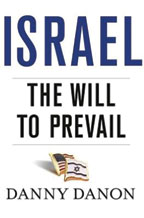 It isn’t often that one gets to see the manuscript of a well-known political figure before it is published, so I was flattered when a good acquaintance asked in June if I would look over an edited manuscript of a Member of Knesset, who needed it in two days. I readily agreed.
It isn’t often that one gets to see the manuscript of a well-known political figure before it is published, so I was flattered when a good acquaintance asked in June if I would look over an edited manuscript of a Member of Knesset, who needed it in two days. I readily agreed.
The author was Deputy Speaker of the Knesset Danny Danon, chairman of the World Likud Organization and chairman of the Immigration, Absorption and Diaspora Affairs Committee in the Knesset.
Forty-one-year-old Danon writes that his late father was severely wounded in the 1969 War of Attrition, something that influenced his entire life. Danon was born the same year the PLO established itself in Lebanon.
The book is, in Danon’s words, “a concise but detailed response to [recent events], including an analysis of the position Israel finds itself in today and an argument for the United States to reassert support for the State of Israel; an illustration of how history shows us Israel is better off when she acts on her own behalf; and a road map for Jewish victory.”
Danon “defines the present moment and describes what Israelis of [his] generation and the next must do to preserve the nation they love.”
Danon says Israel arrived at its current situation because of: the instability in the region and a nuclear Iran; the U.S. administration’s appeasement strategy in relation to the Palestinians; and the ideological war against Israel.
In Part 1 he describes the current landscape as danger and opportunity. Part 2 explains how Israel arrived at the crossroad; and Part 3 is a road map for Jewish victory.
Danon is highly critical as he outlines the series of mishaps of Obama with regard to Israel. He explains and analyzes America’s support for Israel, which has “laced Israel into a precarious position [and] threatens to endanger American interests throughout the Middle East and the rest of the world.”
He states that the current conflict is based not only on territorial demands but on a cultural conflict. Among his recommendations are: that Israel should apply sovereignty over the Jewish communities of Judea and Samaria; stop talking about the establishment of a Palestinian State; and declare its right to exist within the current borders.
He also calls on the Arab world to stop incitement and teaching of hatred.
This book is, in Danon’s words, “a call to action to adopt a new ... way in dealing with the conflict,” namely, a three-state solution engaging Egypt and Jordan.
He sees permanent status of the Palestinians determined in a final peace agreement which would be signed by Jordan and Egypt. In other words, the three-state solution would include Jordan (which has a 70 percent Palestinian population) and Egypt as places of residence for the Palestinians.
There are four appendices: General Provisions and Oslo Accords; the Council of the League of Nations; Resolution 242; and the Biblical connections to Israel and Jerusalem.
This book is provocative. It is informative. It is not just one’s man’s opinions and ideas but a vocalization of what many people in Israel are feeling today. This is a must read for any and all sensible people who care about Israel and who care about a peaceful future.
Sybil Kaplan is a foreign correspondent living in Jerusalem.



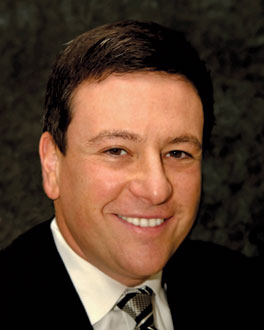 Barbara Bayer recently wrote about a newly released book called “Am I a Jew?” by Theodore Ross. (Oct. 4)
Barbara Bayer recently wrote about a newly released book called “Am I a Jew?” by Theodore Ross. (Oct. 4)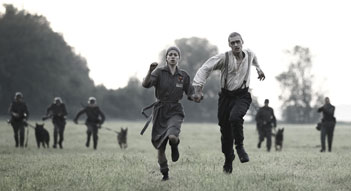 A Jewish Holocaust survivor is haunted by memories of the Polish lover that risked his life to save her. The romantic war drama “Remembrance” directed by Anna Justice is the opening night film of the 14th Annual Kansas City Jewish Film Festival.
A Jewish Holocaust survivor is haunted by memories of the Polish lover that risked his life to save her. The romantic war drama “Remembrance” directed by Anna Justice is the opening night film of the 14th Annual Kansas City Jewish Film Festival.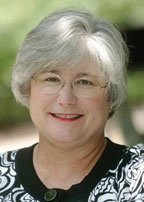 The community is buzzing about a newly published book, “Am I a Jew?” written by Theodore Ross, an author from New York. It’s been out a month or so already. I wasn’t terribly interested in it, and it just sat on my desk waiting to be given to one of our book reviewers. However out of the blue, just before Yom Kippur, I got some phone calls about it. Then I was intrigued.
The community is buzzing about a newly published book, “Am I a Jew?” written by Theodore Ross, an author from New York. It’s been out a month or so already. I wasn’t terribly interested in it, and it just sat on my desk waiting to be given to one of our book reviewers. However out of the blue, just before Yom Kippur, I got some phone calls about it. Then I was intrigued.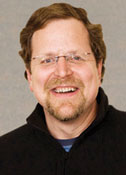 For someone like me, who spent most of his career in the business community, working at Jewish Family Services for the last five years has been a real eye-opener. I knew there were people living in poverty in our community, but I never got close enough to those in need to really understand their stories. But at JFS, as I talk with our social workers and clients, I have learned just how basic some of those needs are.
For someone like me, who spent most of his career in the business community, working at Jewish Family Services for the last five years has been a real eye-opener. I knew there were people living in poverty in our community, but I never got close enough to those in need to really understand their stories. But at JFS, as I talk with our social workers and clients, I have learned just how basic some of those needs are.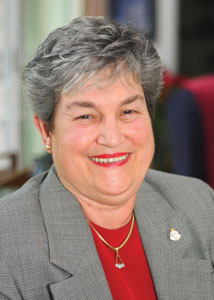 We are all watching history unfold before us. President Obama and Gov. Romney are engaged in a tight race to see who will be the next president of the United States. The Senate race between Todd Akin and Claire McCaskill has the national spotlight shining on the state of Missouri. As it does for every single election, National Council of Jewish Women and its Greater Kansas City Section, of which I am a life member and past president, has words of wisdom to share regarding the upcoming election.
We are all watching history unfold before us. President Obama and Gov. Romney are engaged in a tight race to see who will be the next president of the United States. The Senate race between Todd Akin and Claire McCaskill has the national spotlight shining on the state of Missouri. As it does for every single election, National Council of Jewish Women and its Greater Kansas City Section, of which I am a life member and past president, has words of wisdom to share regarding the upcoming election. The deadline to register to vote in Kansas is Tuesday, Oct. 16. Advance voting by mail begins Wednesday, Oct. 17. Voters must complete an Application for Advance Voting Ballot in order to receive a ballot by mail. In Johnson County registered voters can simply call the election office at 913-782-3441 to request the Application for Advance Voting Ballot or visit www.jocoelection.org and download a form. Per the new state law, a registered voter applying for a mail-in ballot or voting in person must provide a photo ID. Those voting by mail must provide either a valid Kansas’s driver’s license number or non-driver identification card number on the form. There are many valid forms of ID listed on the application; or simply call the election office for more information.
The deadline to register to vote in Kansas is Tuesday, Oct. 16. Advance voting by mail begins Wednesday, Oct. 17. Voters must complete an Application for Advance Voting Ballot in order to receive a ballot by mail. In Johnson County registered voters can simply call the election office at 913-782-3441 to request the Application for Advance Voting Ballot or visit www.jocoelection.org and download a form. Per the new state law, a registered voter applying for a mail-in ballot or voting in person must provide a photo ID. Those voting by mail must provide either a valid Kansas’s driver’s license number or non-driver identification card number on the form. There are many valid forms of ID listed on the application; or simply call the election office for more information.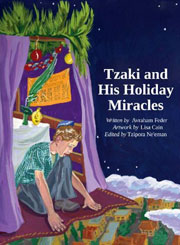 When you receive a review copy written by a former neighbor and friend, you can’t help but take notice, and this was the case when this book arrived in our post office box.
When you receive a review copy written by a former neighbor and friend, you can’t help but take notice, and this was the case when this book arrived in our post office box.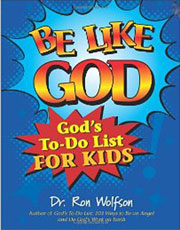 Dr. Ron Wolfson, professor of education at the American Jewish University in Los Angeles, has written about 10 books for children and adults.
Dr. Ron Wolfson, professor of education at the American Jewish University in Los Angeles, has written about 10 books for children and adults.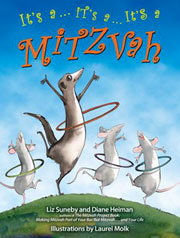 If you know any 3- to 6-year-olds, sit them down and read this to them. As you show them the illustrations of animals they will probably squeal with delight as did the 3-year-old on whom I practiced reading this book.
If you know any 3- to 6-year-olds, sit them down and read this to them. As you show them the illustrations of animals they will probably squeal with delight as did the 3-year-old on whom I practiced reading this book.